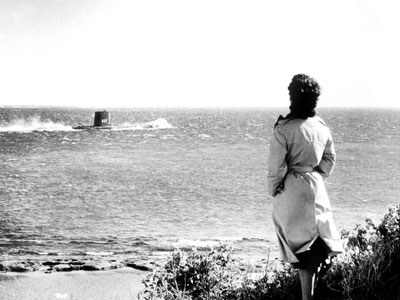Nevil Shute authored the novel in 1957 after he had immigrated to Australia from his native England. Shute was 58 at the time he wrote this story about the last survivors on Earth living out their final days in Melbourne, awaiting a deadly cloud of radiation drifting down from the Northern Hemisphere after a nuclear holocaust in the early 1960's.
A movie was made of the novel in 1959, and like most disaster movies, the film was forced to focus on the personal as the only way to carry the narrative. The idea was not to make a documentary about nuclear war, after all; still, as I remember the movie, things were a little hokey, with Fred Astaire driving race cars as a way to demonstrate the desperate devil-may-care attitude of the survivors. There's a doomed love story, of course; disaster flicks must always have two things happening in the middle of the general desperation: a doomed love story and a part for Ernest Borgnine (although for some reason he wasn't in this cast, which included Gregory Peck, Ava Gardner and Anthony Perkins). Gregory Peck is the straight-arrow Navy captain of the Sawtooth, a submarine which happened to be on patrol near Australia when Armageddon broke out. His wife and kids were in the United States, and while rationally he knows they were doomed, he maintains a kind of hopeful denial. Ava Gardner falls for him, of course, because who can resist Atticus Finch in Navy whites.
There is a long reconnaissance submarine voyage to California and eerie scenes of deserted streets in San Francisco and San Diego. Everyone up north is dead. Pretty soon everyone in Australia will be dead, too.
In British usage, "on the beach" means retired from the naval service. It's catchy if you know the slang, otherwise a little mystifying. In Australia all the denizens were On the Beach, having retired from the world of normality to the waiting room of extinction.
A creative mind could doubtless come up with a scenario where a personal story is told with global warming, presumably in an advanced state, as a backdrop. Ernest Borgnine will obviously not have a part, so that leaves George Clooney, Matt Damon, Brad Pitt and Don Cheadle. One of them is no doubt cast as a climate scientist. That's probably Matt Damon, since he likes roles where he plays a super-bright character, as unlikely as that usually looks. Another is a fighter pilot who's trying to figure out a way to bomb humanity back to a stable climate. Maybe Don Cheadle is the President; why, he asks himself, did I play golf all those Saturdays? Amy Adams, Rachel McAdams and Michelle Williams will have parts, since no one is ever sure which one is which anyway.
I see some difficulties in mounting a production with the same impact or social utility as "On the Beach." For one thing, what was of great relief to audiences leaving theaters in 1959 (I remember seeing the movie at the drive-in and feeling creeped-out when I first saw that "1964" on the calendar - we're not in the present anymore, Toto!) was the sense that they had just seen a movie based on a fantasy: as of 1959, there had been no nuclear war. The Cuban Missile Crisis had not yet occurred. Everything the viewers had just seen could all be avoided. It was "out there" somewhere, not a living reality. When you went home, it was not to a house seething with radioactivity.
A disaster movie about global warming, by contrast, is about a world which is already undergoing critical, perhaps catastrophic, climate change. When you walk out of the theater, it is not with the sensation of escaping from a disturbing fantasy world; it is with a sense of looking at the world around you with newly horrified eyes. An honest movie about climate change cannot truthfully portray a reality where the disasters depicted are necessarily avoidable. The tag line can't be, if you want to avoid the world you just observed for 128 minutes, then support immediately a new energy paradigm. It must be, if we finally do something other than continuing to emit gigatons of CO2 from fossil fuel combustion, we have a shot at not living the nightmare you just saw. As The Dude said when he read the ransom note handed to him by Philip Seymour Hoffman in the role of Brandt: "Bummer, man. That's a real bummer."
Still, I hope Soderbergh or some other talent takes this on. Not Scorsese, because whacking everybody is not going to get us under 400 parts per million all by itself. Someone needs to write the novel. Probably not Cormac McCarthy, great as he is, because when I finished The Road I wondered for a few days why I was getting up in the morning. But someone, and the sooner the better.



No comments:
Post a Comment